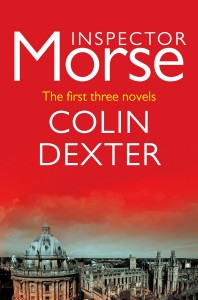 Morse, who has been indelibly portrayed by the late actor John Thaw in some thirty three episodes, first came to life on the pages of Last Bus to Woodstock (1975) where the Chief Inspector is handed the case of the brutal murder of a young girl outside a pub in the titled city. We meet the faithful Sergeant Lewis, whom Morse immediately takes a liking to because he’s willing to disagree with him. Typical Morsian perversity.
Morse, who has been indelibly portrayed by the late actor John Thaw in some thirty three episodes, first came to life on the pages of Last Bus to Woodstock (1975) where the Chief Inspector is handed the case of the brutal murder of a young girl outside a pub in the titled city. We meet the faithful Sergeant Lewis, whom Morse immediately takes a liking to because he’s willing to disagree with him. Typical Morsian perversity.
In this first book, which takes a lot more time than a TV episode offers to get to the truth of things, we find the inspector gleaning clues from here and there until they fall into some sort of pattern. The pattern that’s repeated in this and the subsequent two novels, Last Seen Wearing (1976) and The Silent World of Nicholas Quinn (1977) is that he’s often wrong at first, or second, and generally comes to his wits end before the truth of the matter finally reveals itself to him.
This is rather hard on him, starting as he does with a morose nature of sorts, and does his sidekick no great good either. Throughout his cases Morse comes off as saddened by the affairs of the people whose lives he peers into, and when something like happiness appears to offer itself to him, as it does in the first book, he appears to have the premonition that it would cost rather more than he can afford. For solace he relies on a trinity of vices: crosswords, opera, and considerable quantities of ale.
A delightful bit comes up at the beginning of the second novel, Last Seen Wearing, when Morse is handed a cold case that had been worked on by another inspector who had been killed in an accident.
‘Ainley was a bloody sight better policeman than you’ll ever be. In fact I’m asking you to take on this case precisely because you’re not a very good policeman. You’re too airy-fairy. You’re too . . . I don’t know.’ (reference)
Chief Superintendent Strange may not know, but we’re familiar with the gestalt constructing process that defines Morse, and as for the better policeman, that’s what he has Lewis for. Lewis’ theory’s are almost universally dissmissed by Morse out of hand, but frequently come back to haunt Morse as he finds something in them that gives him a way forward out of the darkness he frequently finds himself brooding in.
Familiar with the character from television, I had some of the expected dissonance meeting Morse, and Lewis, between the sheets of paper that bore them into the world. Or as close as e-ink comes to it. But less than might be expected. Lewis turns out to be older than portrayed on TV, and perhaps a bit more set in his worldview as a result. Morse, perhaps a bit younger, at least at the start, and not quite without hope that he might get something more out of life than solitary pints to keep him company.
Indeed, the young women in the books often find him attractive, and flirt with him more than a bit, but though he’s keenly aware of a reciprocal attraction, he puts it aside for the work at hand.
I wouldn’t say the first three novels yield fast paced drama. Morse and Lewis plod along the trail, often repeating their circuits until the path seems over-worn, light finally dawns and justice is sated, if not always served. I enjoyed all three books, though a certain sameness was soon evident, and though I was happy to read this collection to its end, it left me with no compulsion to follow the inspector through the next ten novels until his death in The Remorseful Day (1999).
Links and References:
- Reference: Dexter, Colin (2013-05-09). Inspector Morse: The first three novels (Kindle Locations 3782-3783). . Kindle Edition.
- Amazon: Inspector Morse: The first three novels by Colin Dexter